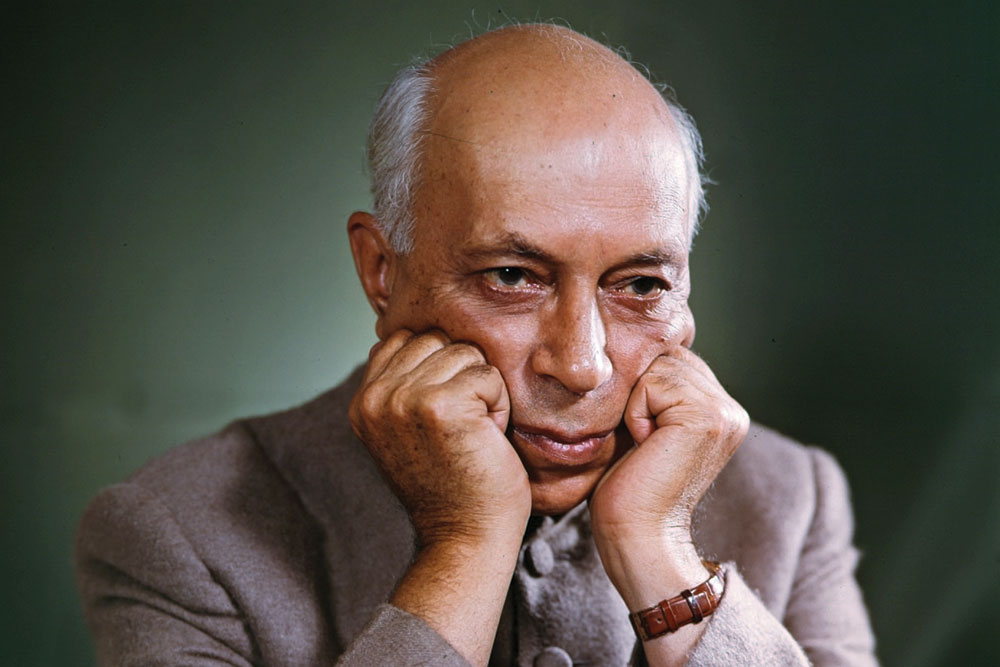The late Sita Ram Goel, a prominent historian, writer, and publisher, had Left leanings during the 1940s, but later became an outspoken anti-communist. He also wrote extensively on the damage to Bharatiya culture and heritage wrought by Nehruvianism. The article is an extract from Goel’s book, How I Became a Hindu, first published by Voice of India in 1982. – Editor  Jawaharlal Nehru wilfully believed that Hindus should stand accused in every situation, no matter who is the real culprit
Jawaharlal Nehru wilfully believed that Hindus should stand accused in every situation, no matter who is the real culprit
Today, I view Pandit Jawaharlal Nehru as a bloated Brown Sahib, and Nehruism as the combined embodiment of all the imperialist ideologies — Islam, Christianity, White Man’s Burden, and Communism — that have flooded this country in the wake of foreign invasions. And I do not have the least doubt in my mind that if India is to live, Nehruism must die. Of course, it is already dying under the weight of its sins against the Indian people, their country, their society, their economy, their environment, and their culture. What I plead is that a conscious rejection of Nehruism in all its forms will hasten its demise, and save us from the mischief which it is bound to create further if it is allowed to linger.
I have reached this conclusion after a study of Pandit Nehru’s writings, speeches and policies ever since he started looming large on the Indian political scene. But lest my judgment sounds arbitrary, I am making clear the premises from which I proceed. These premises themselves have been worked out by me through prolonged reflection on the society and culture to which I belong.
I have already described how I returned to an abiding faith in Sanātana Dharma under the guidance of Ram Swarup. The next proposition which became increasingly clear to me in discussions with him, was that Hindu society which has been the vehicle of Sanatana Dharma is a great society and deserves all honour and devotion from its sons and daughters. Finally, Bhāratavarša became a holy land for me because it has been and remains the homeland of Hindu society.
There are Hindus who start the other way round, that is, with Bharatavarsa being a holy land (punyabhumi) simply because it happens to be their fatherland (pitribhumi) as well as the field of their activity (karmabhumi). They honour Hindu society because their forefathers belonged to it, and fought foreign invaders as Hindus. Small wonder that their notion of nationalism is purely territorial, and their notion of Hindu society is no more than tribal. For me, however, the starting point is Sanatana Dharma. Without Sanatana Dharma, Bharatavarsha for me is just another piece of land, and Hindu society is just another assembly of human beings. So, my commitment is to Sanatana Dharma, Hindu society, and Bhiratavarsha — in that order.
In this perspective, my first premise is that Sanatana Dharma, which is known as Hinduism at present, is not only a religion but also a whole civilization that has flourished in this country for ages untold and is struggling to come into its own again after a prolonged encounter with several sorts of predatory imperialism. On the other hand, I do not regard Islam and Christianity as religions at all. They are, for me, ideologies of imperialism… I see no place for them in India, now that India has defeated and dispersed Islamic and Christian regimes.
I have no use for secularism which treats Hinduism as just another religion and puts it on par with Islam and Christianity. For me, this concept of secularism is a gross perversion of the concept that arose in the modern West as a revolt against Christianity which should mean, in the Indian context, a revolt against Islam as well. The other concept of secularism, namely, sarva dharma samabhava, was formulated by Mahatma Gandhi to cure Islam and Christianity of their aggressive self-righteousness and stop them from effecting conversions from the Hindu fold. This second concept was abandoned when the Constitution of India conceded to Islam and Christianity the right to convert as a fundamental right. Those who invoke this concept to browbeat the Hindus are either ignorant of the Mahatma’s intention or are deliberately distorting his message.
My second premise is that Hindus in their ancestral homeland are not a mere community. For me, the Hindus constitute the nation and are the only people who are interested in the unity, integrity, peace, and prosperity of this country. On the other hand, I do not regard the Muslims and the Christians as separate communities. For me, they are our people who have been alienated by Islamic and Christian imperialism from their ancestral society and culture, and who are being used by imperialist forces abroad as their colonies for creating mischief and strife in the Hindu homeland. I, therefore, do not subscribe to the thesis that Indian nationalism is something apart from and above Hindu nationalism.
For me, Hindu nationalism is the same as Indian nationalism. I have no use for the slogans of “composite culture”, “composite nationalism” and “composite state”. And I have not the slightest doubt in my mind that all those who mouth these slogans as well as the slogan of “Hindu communalism”, are wittingly or unwittingly being traitors to the cause of Indian nationalism, no matter what ideological attires they put on and what positions they occupy in the present set-up. (To be concluded)





